Daily Vocabulary Words: List of Daily Used Words in Leading International Newspapers
Hi there. Welcome to this special section @ Wordpandit.
Our endeavour here is very simple: to highlight important daily vocabulary words, which you would come across in leading newspapers in the country. We have included the following newspapers in our selection:
• The New York Times
• The Washington Post
• Scientific American
• BBC
• The Guardian
• Psychology Today
• Wall Street Journal
• The Economist
We are putting in extensive work for developing your vocabulary. All you have got to do is be regular with this section and check out this post on a daily basis. This is your repository of words that are commonly used and essentially, we are posting a list of daily used words. Hence, this has significant practical application as it teaches you words that are used commonly in leading publications mentioned above.
Visit the website daily to learn words from leading international newspapers.
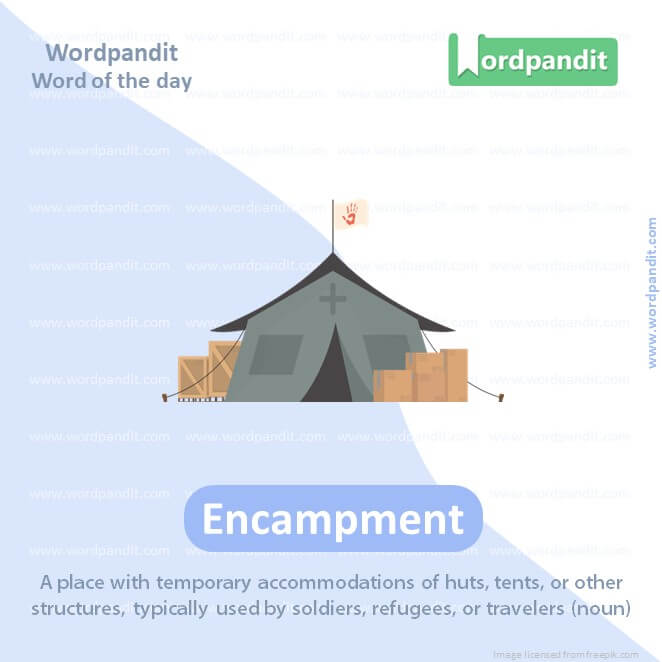
WORD-1: Encampment
CONTEXT: The unhoused draw scant attention from the city, unless a headline-grabbing incident involving an encampment comes into view.
SOURCE: Washington post
EXPLANATORY PARAGRAPH: An encampment is like a temporary home made up of tents or other shelters, usually set up by people who are staying in one place for a short time. It’s like when you build a fort in your living room for a sleepover.
MEANING: A place with temporary accommodations of huts, tents, or other
structures, typically used by soldiers, refugees, or travelers (noun).
PRONUNCIATION: en-KAMP-ment
SYNONYMS: Camp, campsite, bivouac, settlement, outpost.
USAGE EXAMPLES:
1. The scouts set up an encampment in the woods for their weekend trip.
2. The military encampment was strategically located on the hill.
3. Historical sites often include reconstructions of Native American encampments.
4. The festival features a medieval encampment complete with tents and historical reenactors.
WORD-2: Destabilizing
CONTEXT: The consequences of such a move would be so dangerously destabilizing to the nation that the court will almost certainly resort to one of the many legal off-ramps that would prevent Section 3 from being deployed against Trump.
SOURCE: Washington post
EXPLANATORY PARAGRAPH: Destabilizing something means making it less stable or secure. It’s like when someone shakes the table while you’re trying to build a card tower on it, making it wobble and maybe even fall over.
MEANING: Causing something to become unstable (verb).
PRONUNCIATION: dee-STAY-buh-lye-zing
SYNONYMS: Disrupting, undermining, weakening, upsetting, unbalancing.
USAGE EXAMPLES:
1. The sudden resignation of the CEO had a destabilizing effect on the company.
2. Economic crises can be destabilizing for a country.
3. His remarks were seen as destabilizing to the peace talks.
4. The heavy rains were destabilizing the hillside, increasing the risk of a landslide.
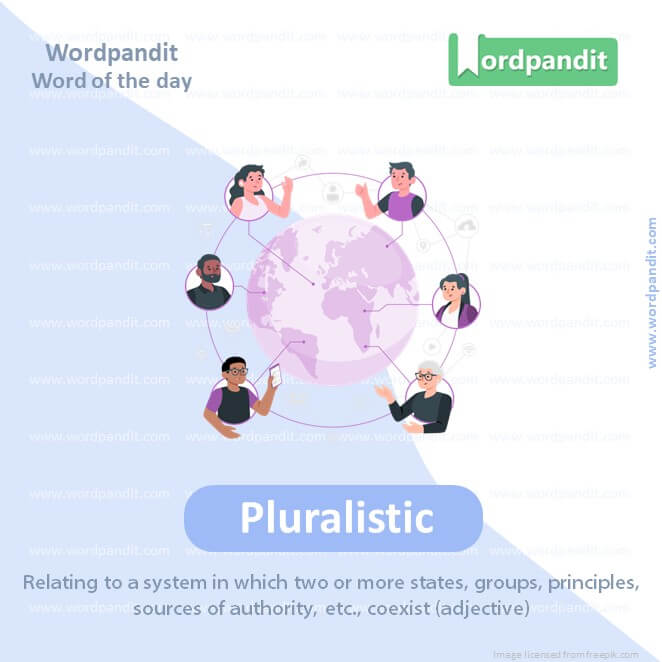
WORD-3: Pluralistic
CONTEXT: A positive-sum society is a more pluralistic and tolerant society because all its members are encouraged to pioneer their own specialty.
SOURCE: New york times
EXPLANATORY PARAGRAPH: Pluralistic describes a situation or system that includes many different groups or ideas. It’s like having a classroom where everyone is from different places and has different stories to share.
MEANING: Relating to a system in which two or more states, groups, principles,
sources of authority, etc., coexist (adjective).
PRONUNCIATION: ploo-RAL-is-tik
SYNONYMS: Diverse, multifaceted, varied, multicultural, manifold.
USAGE EXAMPLES:
1. We live in a pluralistic society where many different cultures coexist.
2. The debate highlighted the pluralistic nature of modern democracies.
3. Her education philosophy is deeply pluralistic, incorporating multiple teaching methods.
4. A pluralistic approach was taken to include all viewpoints in the discussion.
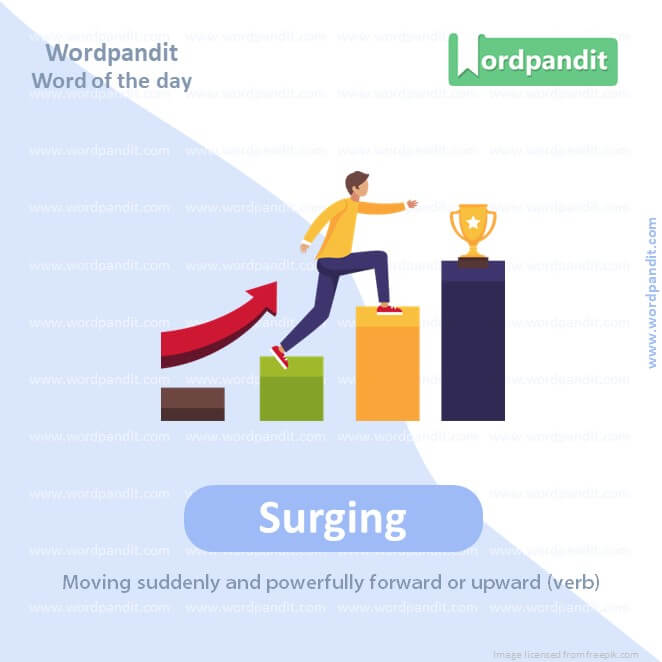
WORD-4: Surging
CONTEXT: Zero-sum thinking is surging on the left as well.
SOURCE: New york times
EXPLANATORY PARAGRAPH: Surging means to move suddenly and powerfully forward or upward, like a big wave in the sea that grows quickly and crashes onto the beach.
MEANING: Moving suddenly and powerfully forward or upward (verb).
PRONUNCIATION: SUR-jing
SYNONYMS: Soaring, swelling, rising, escalating, increasing, burgeoning.
USAGE EXAMPLES:
1. The crowd was surging forward to get a better view of the parade.
2. Interest in the new technology has been surging recently.
3. The river began surging over its banks during the heavy rain.
4. Stock prices were surging after the announcement of the merger.
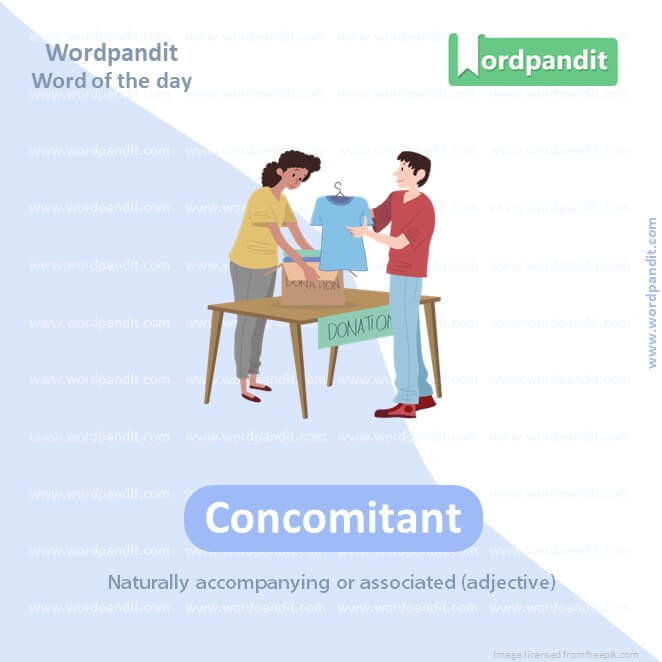
WORD-5: Concomitant
CONTEXT: This disillusion led to a concomitant rise in global populism.
SOURCE: New york times
EXPLANATORY PARAGRAPH: Concomitant means happening at the same time as something else or being associated with it. It’s like when it rains, and you also see lightning and hear thunder.
MEANING: Naturally accompanying or associated (adjective).
PRONUNCIATION: kon-KOM-i-tant
SYNONYMS: Associated, accompanying, concurrent, coincident, attendant.
USAGE EXAMPLES:
1. There are several concomitant issues that need to be addressed.
2. Poverty and poor health are often concomitant.
3. He took on the new responsibilities with the concomitant increase in salary.
4. The drug has several concomitant side effects.
WORD-6: Foreboding
CONTEXT: Many of us greet 2024 with a sense of foreboding. We need Joe Biden to be as big as this year demands.
SOURCE: New york times
EXPLANATORY PARAGRAPH: Foreboding is a feeling that something bad is going to happen. It’s like when the sky gets really dark and cloudy, and you feel like a storm is coming.
MEANING: Fearful apprehension; a feeling that something bad will happen (noun).
PRONUNCIATION: for-BOH-ding
SYNONYMS: Apprehension, dread, premonition, misgiving, unease.
USAGE EXAMPLES:
1. She had a strong sense of foreboding about the trip.
2. The dark clouds gave a foreboding sense to the afternoon.
3. His sudden departure added to the foreboding she felt.
4. The eerie silence was filled with foreboding.
WORD-7: Multifront
CONTEXT: We are in the middle of a multifront conflict that pits the forces of civilization against the forces of barbarism.
SOURCE: New york times
EXPLANATORY PARAGRAPH: Multifront means dealing with several problems or challenges at the same time. It’s like trying to do homework, clean up your room, and watch your little sister all at once.
MEANING: Involving multiple areas or sectors simultaneously (adjective).
PRONUNCIATION: MUL-tee-front
SYNONYMS: Multifaceted, multi-pronged, comprehensive, all-encompassing.
USAGE EXAMPLES:
1. The company’s strategy was multifront, targeting sales, marketing, and innovation.
2. The military operation was conducted on several fronts.
3. A multifront approach to solving the issue proved effective.
4. They faced challenges on a multifront scale during the crisis.
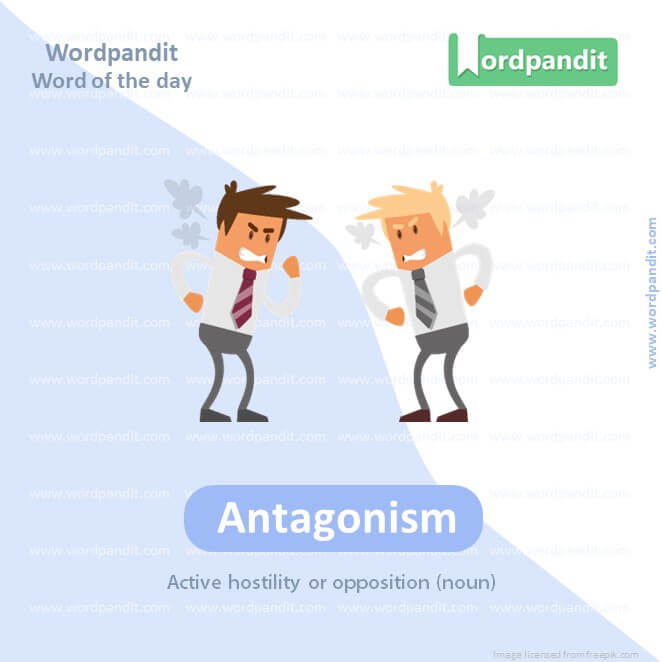
WORD-8: Antagonism
CONTEXT: In this kind of society, life is not about conquest and domination but regulated competition and voluntary exchange. Not about antagonism but interdependence.
SOURCE: New york times
EXPLANATORY PARAGRAPH: Antagonism means strong opposition or hostility between people or things. It’s like when two kids really don’t get along and always argue with each other.
MEANING: Active hostility or opposition (noun).
PRONUNCIATION: an-TAG-uh-niz-um
SYNONYMS: Hostility, animosity, enmity, opposition, conflict, friction.
USAGE EXAMPLES:
1. There was a deep antagonism between the two leaders.
2. The long-standing antagonism between the two groups surfaced again.
3. His plan met with antagonism from all sides.
4. The antagonism in the room was palpable during the debate.
WORD-9: Plummeting
CONTEXT: the American economy is surging, with fast growth, plummeting inflation, real wage increases.
SOURCE: New york times
EXPLANATORY PARAGRAPH: Plummeting means falling down very fast and suddenly. It’s like when you drop a rock off a bridge and watch it quickly disappear toward the ground.
MEANING: Fall or drop straight down at high speed (verb).
PRONUNCIATION: PLUM-it-ing
SYNONYMS: Plunging, falling sharply, crashing, tumbling, dropping.
USAGE EXAMPLES:
1. The stock market plummeted after the news broke.
2. Temperatures are expected to plummet overnight.
3. His confidence plummeted after the presentation went poorly.
4. Sales have plummeted in recent months.
WORD-10: Ingrained
CONTEXT: This liberal dream is still ingrained in the nation’s bones. It’s been covered over by several years of bitterness, disillusion and pessimism.
SOURCE: New york times
EXPLANATORY PARAGRAPH: Ingrained means something that is deeply embedded or established so that it is not easy to change. It’s like when dirt gets really stuck in the grooves of your shoes and is hard to clean out.
MEANING: Deeply embedded or firmly fixed, often referring to habits, beliefs, or
ideas (adjective).
PRONUNCIATION: in-GRAYND
SYNONYMS: Deep-seated, entrenched, rooted, embedded, inherent, permanent.
USAGE EXAMPLES:
1. Such beliefs are deeply ingrained in the culture.
2. His work ethic is ingrained from years of rigorous training.
3. Prejudice can be ingrained in societal structures.
4. She tried to change her ingrained habits.
Vocabulary Daily Use
In the fascinating world of language learning, we often concentrate on taking giant leaps, but the real magic lies in the small steps of ‘vocabulary daily use’. These frequently used words and phrases form the backbone of practical communication and understanding. Therefore, mastering ‘vocabulary daily use’ is a crucial element in achieving language fluency.
To effectively learn ‘vocabulary daily use’, one needs to venture beyond the traditional textbook resources. The real essence of these words unveils itself in everyday exposure and interactions. Engaging with a variety of material like novels, magazines, newspapers, podcasts, films and digital content deepens the understanding of ‘vocabulary daily use’. Immersion in these contexts yield natural, everyday language that bridges the gap between the classroom and the real world.
The journey of mastering ‘vocabulary daily use’ necessitates the integration of innovative memory techniques. Flashcards and the Leitner System aid in embedding these words into your long-term memory by promoting active recall. Additionally, the use of mnemonic devices, which allow you to associate ‘vocabulary daily use’ with personal and familiar narratives, can enhance your ability to remember and recall these words.
Moreover, it’s important to remember that ‘vocabulary daily use’ isn’t just about comprehension- it’s about practice and active usage. Incorporate these words in your day-to-day communication and social interactions. This not only solidifies your understanding but also accelerates learning and internalization of ‘vocabulary daily use’.
In a nutshell, mastering ‘vocabulary daily use’ is a continual process that demands exposure, creative learning strategies and assertive practice. The commingling of these tactics brews the perfect formula that allows learners to seamlessly integrate ‘vocabulary daily use’ into their linguistic repertoire. And with that, they can navigate the nuances of language with confidence and ease.







